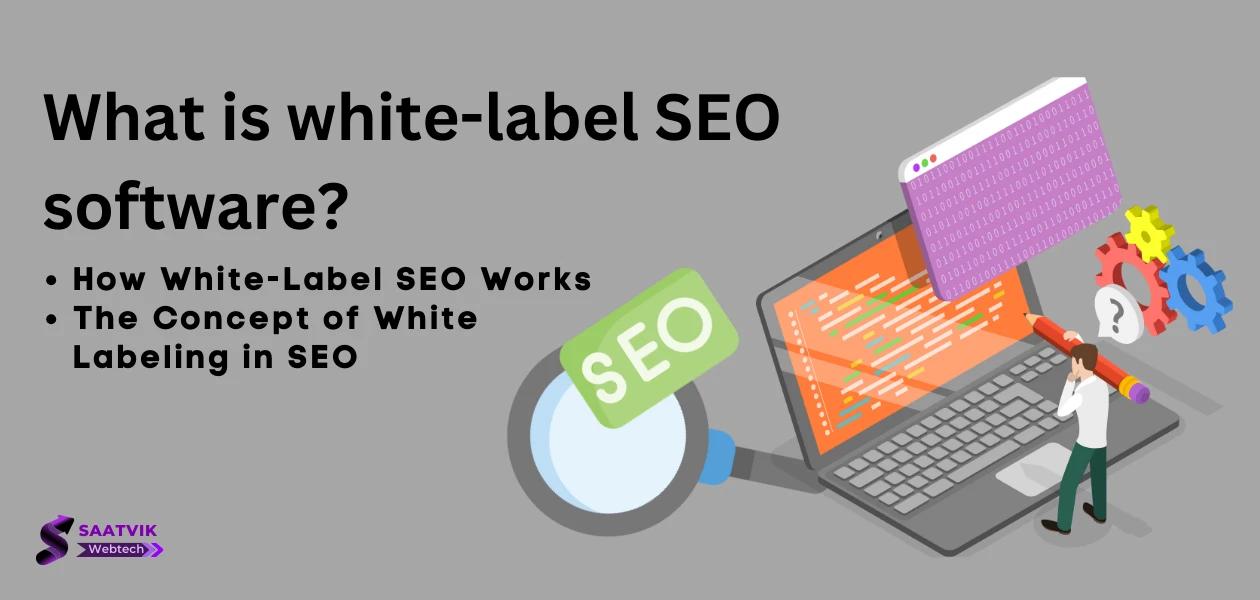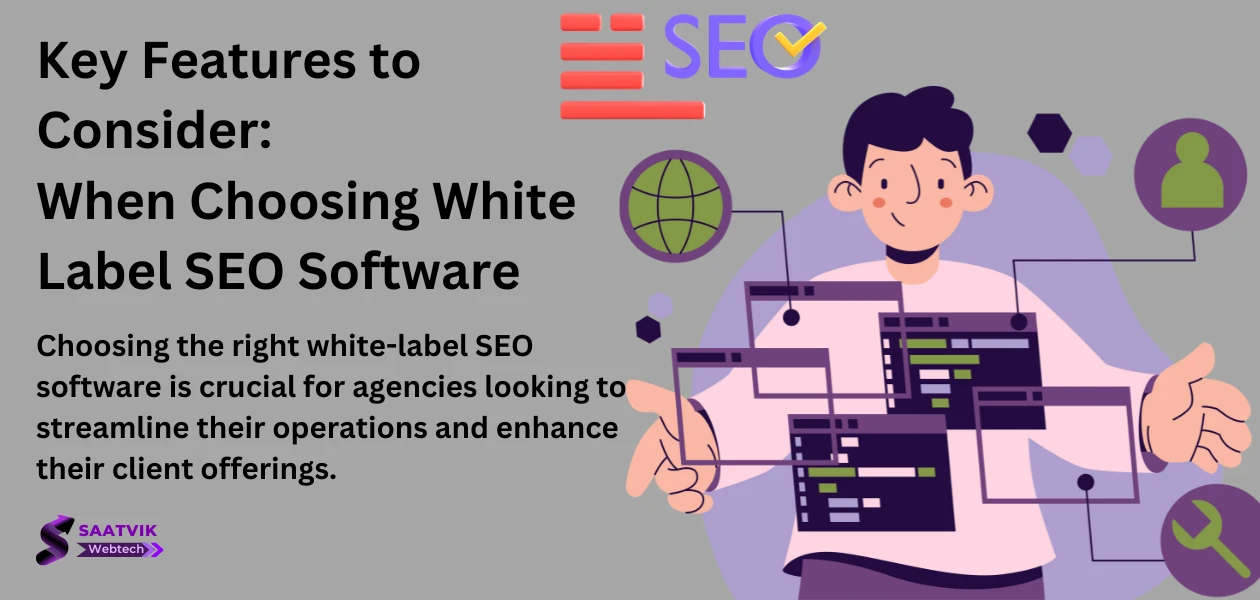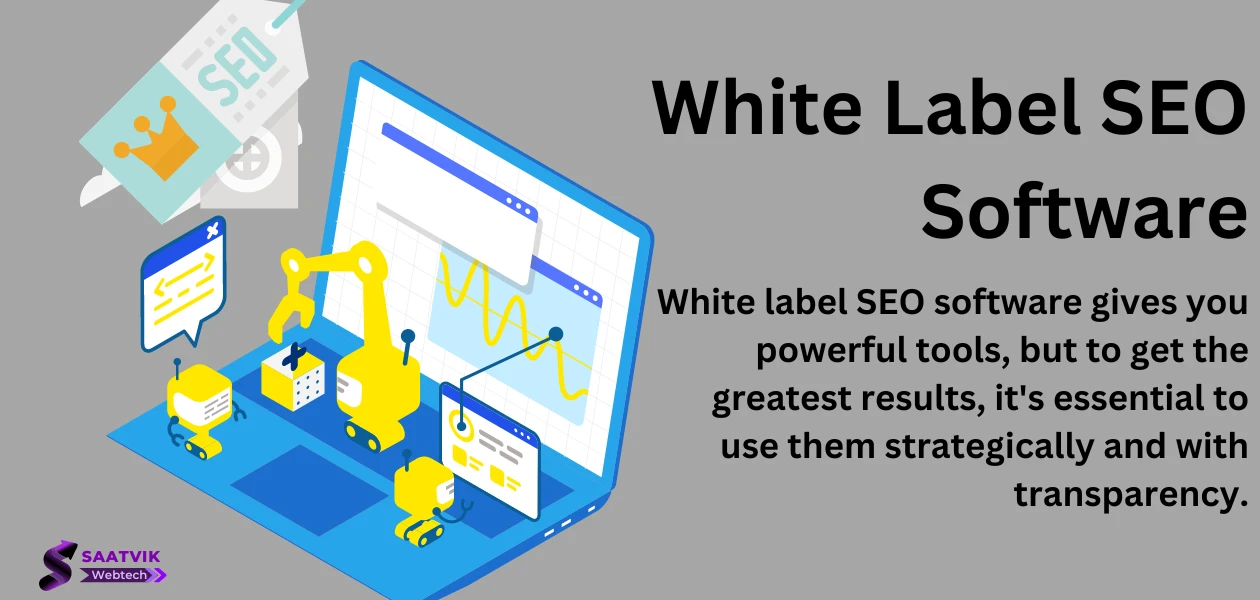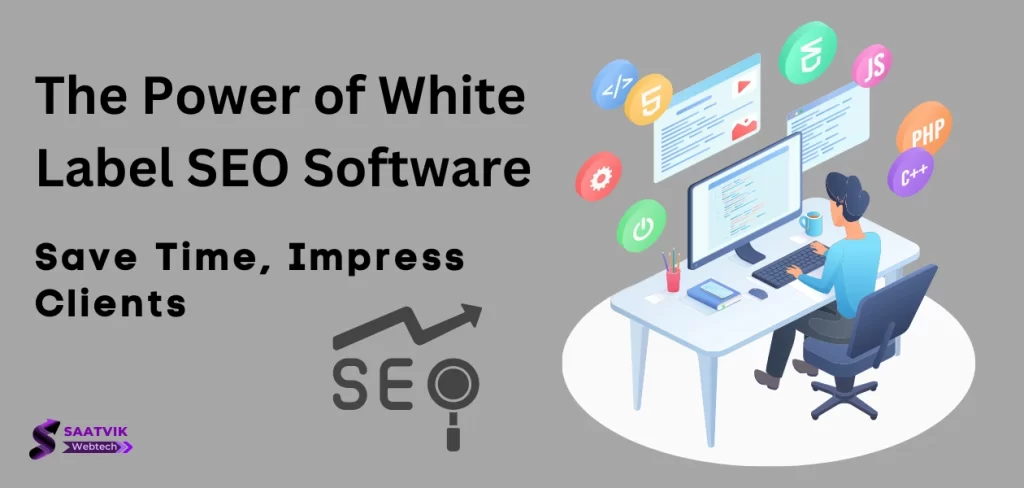In today’s crowded online marketplace, getting your business noticed is tougher than ever. Search engine optimization (SEO) is the key to ranking higher and driving valuable traffic to your website. But let’s be honest: SEO can be complex and time-consuming. If you’re an agency or freelancer looking to streamline your SEO services and impress your clients, white-label SEO software is the secret weapon you need.
Imagine this: You’ve just landed a major new client who needs SEO help—fast. But building out the tools and hiring expertise in-house would be costly and time-consuming. What if you could offer impressive results in record time? That’s the power of white-label SEO software.
Understanding SEO: The Key to Online Visibility
Search Engine Optimization (SEO) is the art and science of making your website more appealing to search engines like Google. When done right, SEO helps your business rank higher in search results, driving more organic (non-paid) traffic to your website. In today’s digital landscape, SEO is essential for businesses of all sizes, as it helps you:
- Increase Brand Awareness: High rankings in search results put your business front and center in front of potential customers.
- Attract Qualified Leads: People searching for solutions are more likely to convert into paying customers.
- Build Trust and Credibility: Appearing at the top of search results signals authority and expertise to your audience.
White Label SEO Software: Streamlining SEO for Agencies and Freelancers
While incredibly powerful, SEO can be complex and time-consuming. White-label SEO software is a game-changer for agencies and freelancers. It involves using a third-party’s SEO platform and rebranding it as your own. Here’s why it’s so beneficial:
- Save Time and Resources: Avoid the cost and hassle of building your own SEO tools and focus on client work.
- Scale Your Services: Expand your offerings without hiring a whole in-house SEO team.
- Enhance Your Brand: Impress clients with professional, branded reports, dashboards, and tools.
 What is white-label SEO software?
What is white-label SEO software?
Let’s break this down to make understanding easier:
- White Label SEO Software: The Basics
Imagine a powerful suite of SEO tools created by a specialized company. These tools cover everything from website analysis and keyword research to backlink tracking and reporting. Now, instead of building your own software, white-label SEO software allows you to rebrand these tools as your own! - How White-Label SEO Works
- Partnership: You partner with a white-label SEO software provider.
- Customization: You add your agency’s branding—logo, colors, even a custom domain name. This makes the software appear as if it were developed in-house.
- Client Use: You offer these rebranded SEO tools and services directly to your clients, under your own name. Your clients never know a third-party is involved.
- The Concept of White Labeling in SEO
White labeling is like putting your own sticker on an existing product. In the SEO context, it means taking high-quality SEO tools and presenting them as your agency’s own solution. This provides benefits like:- Rapidly expand service offerings: Offer robust SEO capabilities without building them yourself.
- Strengthen your brand: clients see you as the SEO expert.
- Save time and money: Avoid costly in-house development.
Let’s illustrate this with a simple example:
Your digital marketing agency gets a new client who needs SEO help. With white label software, you:
- Customize the platform with your branding.
- Run a website audit using the tool, but the report has your logo.
- Present the findings and recommendations to the client as your own analysis.
In essence, white-label SEO software gives you the tools to deliver professional SEO services without your clients ever knowing you’re leveraging an external solution!
Benefits of Using White Label SEO Software
White-label SEO software is a game-changer for marketing agencies and freelancers. It offers significant advantages that streamline your workflow, enhance client satisfaction, and boost your revenue. Here are some key ways you stand to benefit:
1. Increased Efficiency and Scalability
- Automation: White-label tools automate many time-consuming SEO tasks, like site audits, keyword research, and backlink analysis. This frees up hours for strategic planning and client communication.
- Scale with Ease: Take on more clients without hiring and training a full in-house SEO team. Manage multiple client projects simultaneously, powered by the white-label platform.
2. Improved Client Experience and Branding
- Branded Reports: Deliver visually-appealing, professional reports that feature your agency’s logo and branding. Clearly communicate progress, insights, and value to your clients.
- Streamlined Communication: Some platforms offer client dashboards, making it easy for clients to track progress and eliminating the need for constant back-and-forth updates.
3. Deliver Professional SEO Reports
- Comprehensive Data: White-label tools provide in-depth SEO data, from rankings to technical errors. Turn this data into actionable reports that impress and inform your clients.
- Demonstrate Expertise: Reports showcase your SEO knowledge, justifying your services and building trust with your clients.
4. Offer Additional Services Without In-House Expertise
- Expand Skillset: Offer a full-range of digital marketing services, even if your in-house SEO expertise is limited. Your clients get the benefit, and you strengthen your value proposition.
- Stay Ahead of the Curve: White label providers constantly update their tools to keep up with algorithm changes and trends. Stay competitive without having to invest in constant in-house development.
 Key Features to Consider When Choosing White Label SEO Software
Key Features to Consider When Choosing White Label SEO Software
Choosing the right white-label SEO software is crucial for agencies looking to streamline their operations and enhance their client offerings. Here’s a breakdown of the essential features you should prioritize:
-
Rank Tracking and Competitor Analysis
-
-
- Accurate Rank Tracking: Track your clients’ rankings for target keywords across major search engines (Google, Bing, etc.), both locally and globally.
- Competitor Insights: Monitor the rankings of your clients’ competitors, analyze their strategies, and identify opportunities to outrank them.
- Historical Data: Access historical ranking data to track progress over time, demonstrating the value of your SEO efforts to clients.
-
-
Keyword Research and On-Page Optimization Tools
-
-
- Robust Keyword Research: Discover relevant keywords with high search volume and assess their difficulty to help develop a strong content strategy.
- On-Page Optimization Suggestions: Get actionable recommendations for optimizing website elements like title tags, meta descriptions, header tags, and content for target keywords.
- Content Editor: Some platforms even offer a content editor with SEO scoring tools to help you write optimized content directly within the platform.
-
-
Backlink Analysis and Monitoring
-
-
- Backlink Profile Analysis: Analyze your clients’ existing backlinks to identify authoritative and potentially harmful links.
- Competitor Backlink Monitoring: Discover where your client’s competitors are getting their backlinks, providing opportunities for link-building outreach.
- Disavow Tool: Easily disavow harmful backlinks that could negatively impact rankings.
-
-
Reporting and White Labeling Capabilities
-
-
- Customizable Reports: Generate professional-looking reports with your agency’s logo and branding.
- White-Labeled Dashboard: Provide clients with access to a branded dashboard where they can see their SEO progress and reports.
- Scheduled and Automated Reporting: Save time by setting up recurring automated reports delivered directly to clients.
-
-
Ease of Use and Scalability
-
-
- Intuitive Interface: Look for a platform with a user-friendly interface to minimize training time for you and your team.
- Scalability: Ensure the platform can grow with your agency, accommodating more clients and projects with ease.
-
-
Integrations with Other Marketing Tools (optional)
-
- Google Analytics and Search Console: Integrate with these vital tools to cross-reference SEO data and gain deeper insights.
- CRM Integrations: Connect your SEO reporting to your CRM for a holistic view of client data.
Important Note: Prioritize the features most aligned with your agency’s specific needs and the types of clients you serve. Reputable white-label SEO software providers often offer free trials or demos, allowing you to test-drive different options before making a commitment.
Choosing the Right White Label SEO Software for You
Finding the perfect white label SEO software is essential for maximizing the benefits for your agency or freelance business. Here’s a step-by-step guide to making the best decision:
Step 1: Assess Your Needs and Budget
- Analyze Your Services: What do you currently offer your clients? Which SEO areas would you like to expand into (e.g., technical SEO, local SEO, content optimization)?
- Prioritize Features: Create a list of must-have features for your ideal tool. This could include robust reporting, keyword research capabilities, or in-depth competitor analysis, depending on your focus.
- Determine Your Budget: White-label solutions come in different pricing tiers. Set a realistic budget before you start your search to avoid wasting time on unaffordable options.
Step 2: Research and Compare Your Options
- Gather Recommendations: Ask fellow agencies and freelancers for the platforms they use and like. Scour industry blogs and forums for reviews and comparisons.
- Check Core Features: Ensure potential providers offer the features you prioritized based on your needs assessment.
- Scrutinize White Labeling Options: How deep does their customization go? Can you truly make the platform feel like your own with colors, logo, and client-facing reports?
- Assess Support: What kind of support does the provider offer? Is it email only, or do they have phone or live chat? Quick support is essential when facing technical issues.
Step 3: Take Advantage of Free Trials and Demos
- Hands-on Experience: Most reputable white-label SEO software providers offer free trials or demos. This is your chance to get a feel for the interface and test features before committing.
- Test with Real Data: Use the trial to run reports or analyses for existing clients. This gives you the best gauge of whether the tool delivers the insights you need.
- Ask Questions: Don’t hesitate to ask the software provider questions during your trial period. This will help determine how responsive and knowledgeable they are.
Important Tip: Don’t just go for the biggest brand name or the lowest price. Choose the white-label SEO software that best aligns with your specific business needs and budget and provides the flexibility you need to impress your clients.
Getting Started with White Label SEO Software
Once you’ve chosen your white-label SEO provider, it’s time to make the platform your own and start delivering value to clients. Let’s tackle this step-by-step:
1. Customize Your Platform
- Branding is key. Upload your agency’s logo, choose color schemes that match your brand, and customize email templates. This instantly transforms the software into an extension of your services.
- Your Domain, Your Credibility: Most white-label SEO platforms allow you to link to your own custom domain (e.g., [invalid URL removed]). This enhances professionalism and eliminates any mention of the third-party provider.
2. Client Onboarding
- Client Accounts: Create individual client accounts within the platform. Here, you’ll connect their websites for tracking and analysis.
- User Permissions: Fine-tune access levels. You may want clients to have view-only reports, while your team members need broader functionality to run audits and implement changes.
3. SEO Audits and Reporting
- The Audit: Your Baseline: Run a comprehensive SEO audit for each client’s website. This analyzes technical health, on-page optimization, backlink profiles, and more. It’s your starting point for improvement.
- White-Labeled Reports: Generate visually appealing, branded reports that explain the audit findings in clear terms clients can understand. Regular reports track progress and demonstrate the value you provide.
- Beyond Reports: Many white-label platforms offer a client-facing dashboard where they can see key metrics and insights without needing a full report each time.
Additional Tips:
- Training and Support: Most white-label SEO software providers have extensive documentation, video tutorials, or even dedicated support to help you master the platform’s features.
- Client Communication: Even with detailed reports, schedule time to explain the audit results to clients, educate them about SEO, and outline your action plan.
Important Point: White-label SEO software gives you powerful tools, but remember, they support your strategic expertise. Combine the data insights from the platform with your knowledge of the client’s business and goals to craft winning SEO campaigns.
Best Practices for Using White Label SEO Software
White label SEO software gives you powerful tools, but to get the greatest results, it’s essential to use them strategically and with transparency. Here are key practices to maximize your success:
1. Transparency with Clients
- Be open about your processes. While you don’t need to reveal every technical detail, being upfront with clients about utilizing specialized third-party tools builds trust.
- Explain the benefits. Highlight how white-label solutions provide them access to cutting-edge SEO expertise and technology beyond what you might be able to build in-house. This reinforces your commitment to their success.
- Set expectations: Be clear in your contracts or agreements about the use of white-label solutions if this transparency is important to you.
2. Continuous Learning
- SEO is ever-evolving; Google’s algorithms and best practices change over time. Stay updated on the latest trends and shifts through industry blogs, webinars, or dedicated SEO resources.
- Provider updates: Reputable white-label SEO software providers consistently upgrade their tools. Be aware of new features and how they can enhance your offerings.
- Adapt your services. White-label SEO helps you stay agile. As you learn, refine your SEO service packages, reporting, and the value proposition you offer clients.
3. Combining Tools with Strategy
- Tools support, not replace, strategy: White-label software gives you excellent data (keyword rankings, backlink profiles, etc.), but the insights you draw from this data are what drive client success.
- Prioritize a tailored approach: Each client has unique goals and audiences. Ensure your SEO strategies reflect this, even when using standardized tools.
- Human analysis is key. Don’t over-rely on automated reports. Always provide a layer of human interpretation and recommendations to maximize the value for your clients.
Additional Tip: Many white-label SEO providers offer educational resources or support to help their partners succeed. Take full advantage of these to enhance your own SEO knowledge and improve the results you deliver for your clients.
White-label SEO Software vs. In-House Solutions
Choosing between a white-label solution and building your own in-house SEO capabilities is a crucial decision for agencies. Let’s break down the pros, cons, and when each option might be the best for your business:
Pros and Cons
White-label SEO Software
- Pros:
- Cost-Effective: Eliminates development and maintenance costs of SEO tools; subscription fees are generally lower than hiring in-house staff.
- Time-Saving: Access to ready-made tools and reports accelerates your workflow.
- Expertise on Demand: Tap into the expertise of dedicated SEO professionals employed by the white-label provider.
- Scalability: Easily add or reduce services as your client base fluctuates.
- Cons:
- Limited Control: You may have less direct control over tool features and updates.
- Dependence on the Provider: Your success is partially tied to the software provider’s reliability and support.
In-House Solutions
- Pros:
- Complete Customization: Build tools and processes tailored specifically to your agency’s needs and workflow.
- Differentiation: Potential to create a unique competitive advantage with proprietary tools.
- Cons:
- High Investment: Significant development and maintenance costs for building and updating your own tools.
- Specialized Skillsets: This requires hiring or training a well-rounded team of SEO specialists.
- Slower time-to-market: Building your SEO capabilities from the ground up takes significant time.
Determine When Each Solution is Ideal
- Choose white-label SEO software if:
- You’re a small or medium-sized agency with a limited budget.
- You need to quickly offer SEO services without extensive setup.
- You don’t require extremely niche or highly customised SEO solutions.
- You prefer to focus on client relationships and strategy over tool development.
- Opt for In-House Solutions if:
- You’re a large agency with a significant budget and a long-term focus on SEO.
- You need absolute control over every aspect of your SEO process.
- You have highly specialized needs that off-the-shelf tools don’t address.
- You aim to make proprietary SEO tools a point of differentiation.
Important Considerations:
- Hybrid Approach: Some agencies find success by combining white-label solutions for core SEO tasks and supplementing them with some in-house customization or development.
- Future Plans: Think about where you see your agency in a few years. If rapid growth is expected, starting with white-label might be more practical, as might transitioning to in-house as the business scales.
Common Myths About White Label SEO
White-label SEO solutions offer a wealth of benefits, but misconceptions persist that might discourage some agencies. Let’s dispel the most common myths:
Myth 1: A white label Low low quality.
Some assume that because a white-label product isn’t built in-house, it translates to lower quality. However, the opposite is often true. Dedicated white-label SEO providers invest heavily in research, development, and constant updates to their platforms. These focused companies specialize in creating SEO tools and can offer levels of expertise that would be difficult for a generalist agency to replicate.
Myth 2: You Lose Control
Another misconception is that using white-label SEO software means relinquishing control over your client’s work. The reality is that reputable white-label providers give you a high degree of flexibility while streamlining the technical aspects of SEO. You maintain control over:
- Client Strategy: You continue to tailor the overall approach based on your clients’ unique needs and goals.
- Client Communication: You’re still the primary face of SEO services for your clients.
- Pricing: You determine your own pricing structures.
Myth 3: Too Expensive for Small Agencies
White-label SEO software is often seen as a luxury for large agencies only. Fortunately, this isn’t true. Here’s why white-label SEO is accessible for agencies of all sizes:
- Scalable Pricing Models: Many providers offer subscription tiers or pay-per-report options to suit diverse budgets.
- Eliminates Overhead: Building your own SEO toolset involves development costs, hiring specialists, and continual maintenance. White-label solutions remove these overhead expenses.
- Frees Up Time: With technical tasks streamlined, your team can focus on client acquisition and strategy, accelerating growth for small agencies.
Busting these myths clarifies the potential for white-label solutions to enhance your agency’s offerings, efficiency, and ultimately, your bottom line.
Conclusion
White-label SEO software is transforming the way digital marketing agencies and freelancers approach search engine optimization. Let’s recap the key benefits:
- Efficiency & Scalability: Outsourcing technical SEO tasks frees up time and resources, allowing agencies to focus on client relationships and growth.
- Professionalism & Branding: White-labeled reports solidify your expertise and elevate your brand in the eyes of clients.
- Expanded Service Offering: Deliver a comprehensive suite of digital marketing services without developing everything in-house.
- Cost-Effectiveness: Eliminate high development costs and investment in specialized SEO talent.
The Future of White Label SEO
As SEO continues to evolve, so will white-label solutions. We can anticipate increased sophistication in tools, better integration with other marketing platforms, and the potential for AI-powered insights to refine SEO strategies. The line between in-house and white-label will continue to blur, giving agencies more flexibility to deliver top-notch services efficiently.
Call to Action
If you’re an agency or freelancer aiming to streamline your SEO operations, enhance client deliverables, and scale your business without breaking the bank, exploring white-label software could be a transformative step. Start researching reputable providers, take advantage of free trials, and discover how white-label SEO software can propel your business to new heights.
FAQ (Your Questions Answered)
FAQ 1: I’m a small agency. Is white-label SEO software right for me?
Answer: Absolutely! White-label software is especially beneficial for small agencies. It eliminates the high costs of developing your own tools and hiring specialized SEO staff. You can quickly expand your service offerings, impress clients, and focus on growing your business.
FAQ 2: Won’t clients find out I’m using a third-party solution?
Answer: Not at all! Reputable white label SEO providers allow you to fully customize the platform with your agency’s branding. Clients will see your logo, colors, and domain name, making it appear as if you developed the tools in-house.
FAQ 3: Do I lose control by using white-label SEO software?
Answer: Definitely not! White-label software streamlines technical tasks while you retain complete control over client strategy, communication, and pricing. You decide how to utilize the tools and insights to best serve your clients’ needs.
FAQ 4: How do I get started with white-label SEO software?
Answer: Start by researching reputable providers, taking advantage of free trials, and assessing their features against your agency’s needs. Once you’ve chosen a platform, you’ll customize it with your branding, add clients, and begin running audits and generating reports.
FAQ 5: What if I don’t have extensive in-house SEO expertise?
Answer: That’s the beauty of white-label solutions! They provide access to cutting-edge tools and expertise developed by specialists. This allows you to offer comprehensive SEO services even if your in-house knowledge is limited, strengthening your value proposition to clients.
